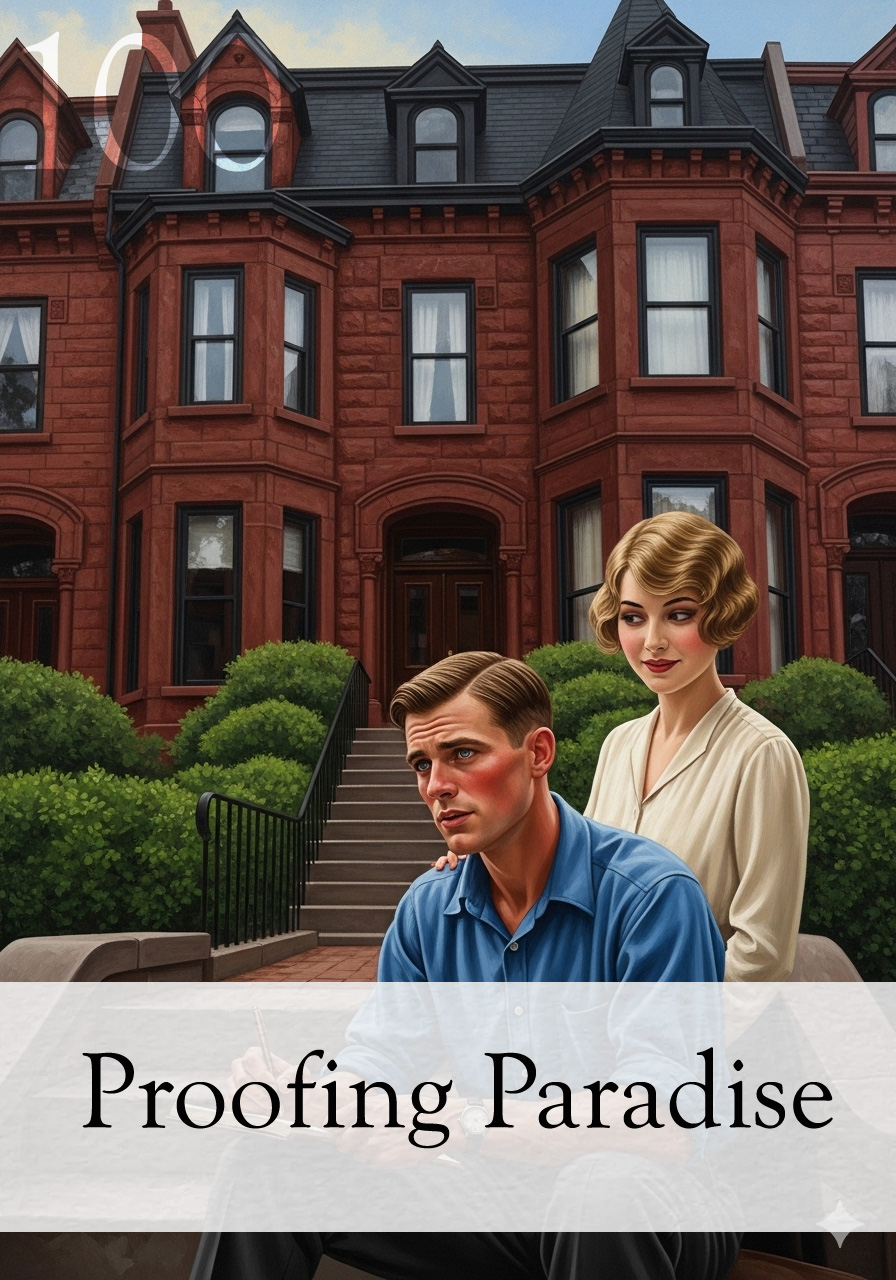Listen the podcast discussion of the article:
You can listen a 10-minute version of the story here
After quitting his job in New York and returning to his parents’ house in Saint Paul in July 1919, the 23 year-old Scott Fitzgerald was getting down to work on a new version of his debut novel, This Side of Paradise, that had a bit more order, and a bit more of a conclusion. On July the 26th he had written to Scribner, updating them on his work: “Dear Mr. Perkins: After four months attempt to write commercial copy by day and painful half-hearted imitations of popular literature by night I decided that it was one thing or another. So I gave up getting married and went home. Yesterday I finished the first draft of a novel called, The Education of a Personage.” Scott went on to explain in a very confused and often contradictory manner that it was “in no sense a revision” of the last book he had sent them, despite it including some of the same material and having a “strong family resemblance” to it. He just had one request: if he sent the book by August 20th would they be able to publish it by October? It was an outrageously confident question. His book hadn’t yet been accepted. Talking about a publication date was about as pushy as it got. The last book, he told them, had been a tedious “disconnected casserole” of a novel. With a little bit of fine-tuning, he thought he now had something of worth. He was sure they would agree. [1]
The first phase was now complete. It just required proofing and then typing. Looking around for support he drafted in an old school friend, Katharine Gotzian Tighe, to read through it for errors and to make further recommendations to style and content. In the last year of her life, Zelda would explain how Scott would always have to have women like Katharine around “to stimulate him and turn to them when he got low and needed a lift.” There was, moreover, nobody who knew more about his childhood in Saint Paul than Katharine, now Mrs Hart Fessenden. [2] It was an inevitable choice in the circumstances. Scott’s Princeton buddy, Edmund Wilson, who would have been more than capable of tidying up the mess, had only landed back in New York in July. Having just been demobilized from the army he was now fiercely immersed in finding work and renting digs. On August 9, 1919, and not being entirely certain about his whereabouts, he had written to Scott on the off chance he was at his parents’ house. Wilson was also trying to get in touch with John Peale Bishop, another of their pals who was well and truly off the radar. Scott sat in his third-floor bedroom, the papers piling up around him, excited at his friend’s return and absorbing the full, delightful oxygen of his news. During his time in France, Wilson had been reading Zola and was intent on collaborating on some stories with a realist-leftist bent on America’s part in the war. Zola had done something similar after the Franco-Prussian war. He went on to tell Scott that he had assembled six different writers to tell their own stories of the war with none of the usual sugar-coating. Like Zola’s original collection, Wilson wanted one of the stories to deal with the mismanagement of the war by the government and its impact on civilians back home. That was where Scott came in. Bishop and himself had both served overseas. What they wanted now was the view of the war from home.
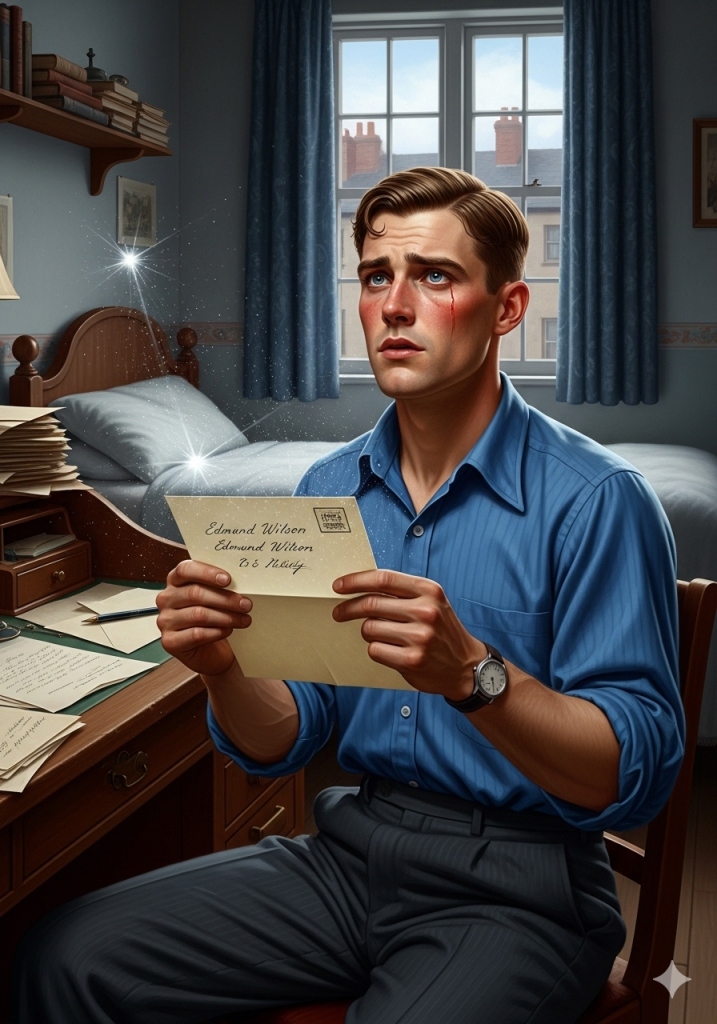
In all fairness, it was like being invited to a party that everybody knew you had no chance of attending. Like so much of what Wilson said, it had started out as a compliment and then flip-flopped into an insult. Without actually saying it, they wanted him to write The Slacker’s Tale. Not for the first time in his life, Scott was being excluded. Having never served in Europe, the only thing he had to contribute was an account of public opinion. His heart must have sank. It had become something of a ritual to him now. He would gain a certain amount of momentum only to have it slowed to a desolate crawl. As a response, he had developed a trick. He would take the barbs, the slights, the disappointments and the failures and attempt to harness all that energy, as negative as it was, so that it shone like the brightest of stars. There was triumph to be had from failure, but inevitably there were times when all those explosions and collisions would trigger the star’s collapse. It was like that now. Sometimes the barbs and the insults fuelled the fire, but there were moments during that time that they doused the flames. The more he read of Wilson’s letter, the more anxious he became. The letter was full of all the usual digs about his efforts for the Saturday Evening Post, the Catholicism he still ‘clung to’, his lack of ‘artistic conscience’, and the fact that Scott never got to serve abroad. It was all laddish banter, he appreciated that, but the postcard that Edmund mailed some five days later was even worse: “I hope your letter isn’t a fair sample of your present literary methods: it looks like the attempt of a child of six to write F.P.A.’s [Franklin P. Adams] column.” [3] Like so many people whose talent was somewhat difficult to quantify, Wilson would deliver the cruellest of insults under the guise of playful razzing simply to preserve the weak dynamics that kept him in this position of inexplicable dominance.
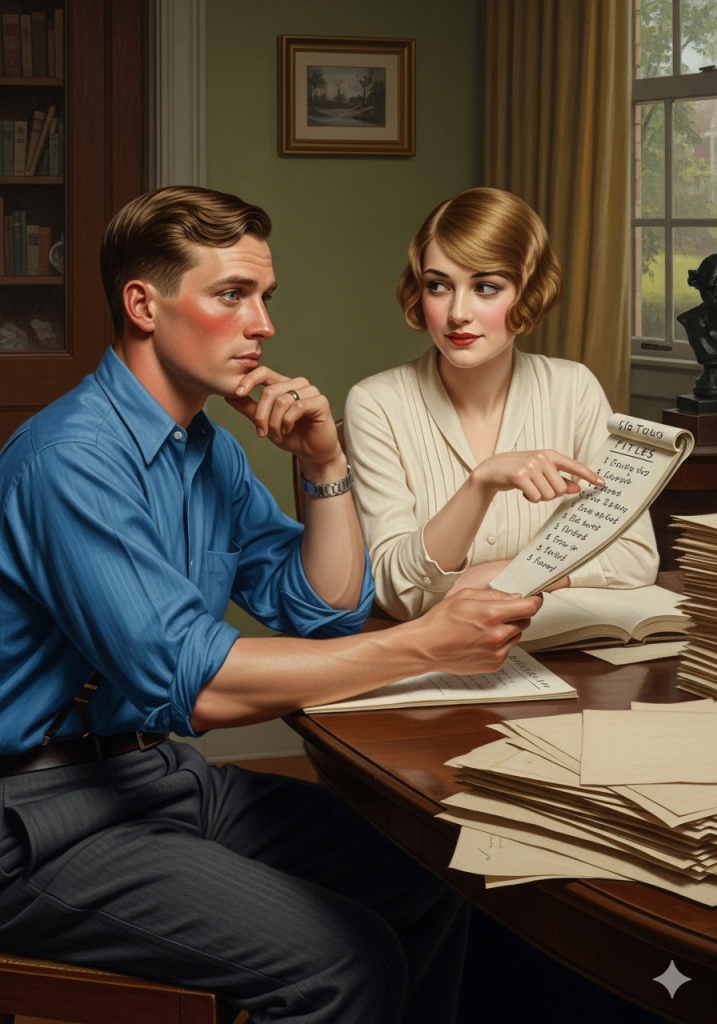
Scott weighed the letter up for a few days before writing back, telling him that he was deep in the throes of a new novel and had wanted his reaction to the possible titles: ‘The Education of A Personage Romantic Egotist’ or ‘This Side of Paradise?’ Edmund had duly ignored the request and pressed on as usual with his mission to undermine him. [4] That’s the one thing he wouldn’t get with Katharine Tighe. They were old, old friends whose contributions to The St Nicholas Magazine as children had bonded the pair in the most honest and deepest of ways — they were roots in the same soil, so to speak. And there was another reason for roping Katharine into the exercise: his training-camp romance with Zelda seemed to be all but over and the plucky, plain-speaking ‘Tiggy’ would provide the constancy and the tolerance that few other friends could offer. She could correct him without judging and give him just the right words of encouragement when he thought there wasn’t a soul in the world who was listening. If anybody should bear witness to his birth as a successful author, it should be someone who believed in him almost as much as himself.
There were other things they shared too. Ambrose Tighe, Katharine’s maternal grandfather, Conrad Gotzian, had been among the men who had built up the town in the 1890s and like Scott’s grandparents, the McQuillans, was a good friend of James J. Hill and his family. [5] Scott and Katharine would often laugh over a clipping from the Saint Paul Globe that both families had kept in the family album. The article, entitled ‘Medieval History of Tenth Street and its Mansards’, featured a series of striking images of the street’s six most magnificent houses. One showed the house built by Scott’s grandfather, Philip F. McQuillan, with its mansard roof and square tower, and another was the ‘Old Gotzian House’ the once crowning glory of the so-called ‘lower town’ and described in the text as ‘extraordinarily large’. The houses, the article went on, were a glorious gothic tribute to a “fine medieval era” abounding in towers and “fixed in the early 70s.” They stood for neither the classic period of the 1850s or for the “dull time called nowadays.” Saint Paul had turned to Europe for inspiration long before the Great War. [6] Now yellowing with time, they were pictures of old houses in an old part of town torn from a dreary old newspaper. Out of all this would emerge a private joke between the pair: the past is forever, the future is never. [7] Scott wouldn’t always share such flippant views of the past, but for the moment at least, it was the future that drew them together.
Katharine’s father, Ambrose Tighe, a Brooklyn-born lawyer and former reporter continued the family tradition of furrowing a plot among the town’s elite. Someone recalling his time as a tutor of Classics at Yale would write that his lectures were “so far outside the text-book” that even the deadest of languages would spring to life in his hands. In a report on his marriage to Harriet Gotzian in June 1893 , Tighe was described as a “profound thinker, fluent and brilliant conversationalist, apt and ready orator, and graceful and forceful writer.” [8] The summer that Scott and Katharine had got down to work on the novel, Ambrose had just returned from a convention in La Crosse, where, as newly elected president of the Minnesota State Bar Association, he had given his full and unequivocal backing to the League of Nations being drafted up in Paris. Joining him in the Stoddard Hall that evening was former President Taft, whose vision of the League was just as beatific as President Wilson’s. After being introduced by Tighe, Taft made a rousing speech condemning fellow members of the Republican Party who were using it as a wedge issue ahead of the election: “If you are as convinced as I am that this is the greatest step forward to save civilization at this present time, purge your minds of the irrelevant criticism and give it your unqualified endorsement and active support.” [9] A week later, Mirrors of Washington author, Clinton W. Gilbert, would be fuelling paranoia with a disturbing prediction: the plans for the Treaty and the world’s radio communications being drawn up by British capitalists were going to leave America “voiceless”. He who controlled what the world thinks, controls the world, Gilbert had cautioned. Tighe’s intervention came just as other leading Republicans were accusing Taft of being leaned on by Wall Street. In the words of Senator William Borah of Idaho, leader of the treaty’s opposition group, The Irreconcilables, “big business”, anxious to protect their European interests, was at the back of propaganda to force Senate to accept the Covenant of the League of Nations. Having the support of respected patriots and prominent Skull and Bones members like Tighe was crucial to Taft’s efforts to convince them otherwise. During the war, Ambrose had served as attorney to the Public Safety Commission a government funded watchdog set-up in the wake of America’s entry into the war. [10] The commission, known for its broad power and sweeping definition of disloyalty, also served to suppress dissent, create state-wide registers of aliens and promote unity among Americans. As an Irish-American married to a German-born American, Katharine’s father would have been under more pressure than most to prove his patriotism. In fact his career may well have depended on it.
Although Scott would joke that she had probably never read a novel in her life, Katharine immediately got to work on removing any underserving gaffs and ‘absurdities’ from its pages at the home of her parents on Dayton Avenue, her Vassar education filtering out much of its remaining cork. [11] Whilst the vast majority of alterations were largely confined to spellings and bad grammar, Tighe did make several stylistic suggestions, sometimes single words and occasionally entire phrases. [12] One passage she persuaded Scott to ditch in its entirety related to Scott’s Newman School mentor, Sigourney Fay, in which he was being described as an overly ambitious society priest. [13] The suggestion may have been made partly because it reduced him to the level of caricature. Fay — or rather Darcy in the novel — fulfils the role of spiritual counsellor to the novel’s protagonist, Amory Blaine. Presenting him a devious and opportunistic social climber, however comically put, would almost certainly have undermined the reader’s sympathy for the character. The original description may have also borne too great a resemblance to Monsignor Catesby of Benjamin Disraeli’s Lothair, a self-serving playboy priest of the lowest moral standards. A similar concern would be raised by Shane Leslie in his review of the novel the following year. Like their friend and counsellor, Father Fay, the acting head of Scott’s prep school in New Jersey, was the right hand man of America’s leading Catholic cleric, Cardinal Gibbons. As Leslie writes in his review of the author’s novel, Fay was a society priest in a country where they were rare but he wasn’t greasing his own wheels when carrying out any of his pastoral duties. People may have adored him but he was “ pious to the point of mysticism.” [14] Katharine’s input would also be sought on the novel’s female characters. Conscious that he was writing from a very narrow masculine perspective, Scott permitted Tighe to adjust a number of Amory’s romantic encounters to weed out any goofy, teenage cliches and get the balance right. Fitzgerald scholar, Mary Jane LeVigne, identified one particularly sensible edit in her 2021 essay, Midwife of Paradise. Scott’s original draft had read, “Sometimes, when he was particularly loquacious, she went to sleep in his arms and he held her like a piece of rare China.” Hugh Walpole had written something similar in one of his novels, and even back then it was a bit of a cliché. [15] At Tighe’s suggestion, the passage was changed to “she went to sleep in his arms but he loved that Rosalind—all Rosalinds as he had never in the world loved anyone else.” Scott’s original effort was a trite and commonplace simile that put Amory’s insurmountable love for Rosalind on the same existential level as teacups, writes LeVigne. [16] Tighe had the wisdom and the humour to see this, and Scott had the good sense to change it.
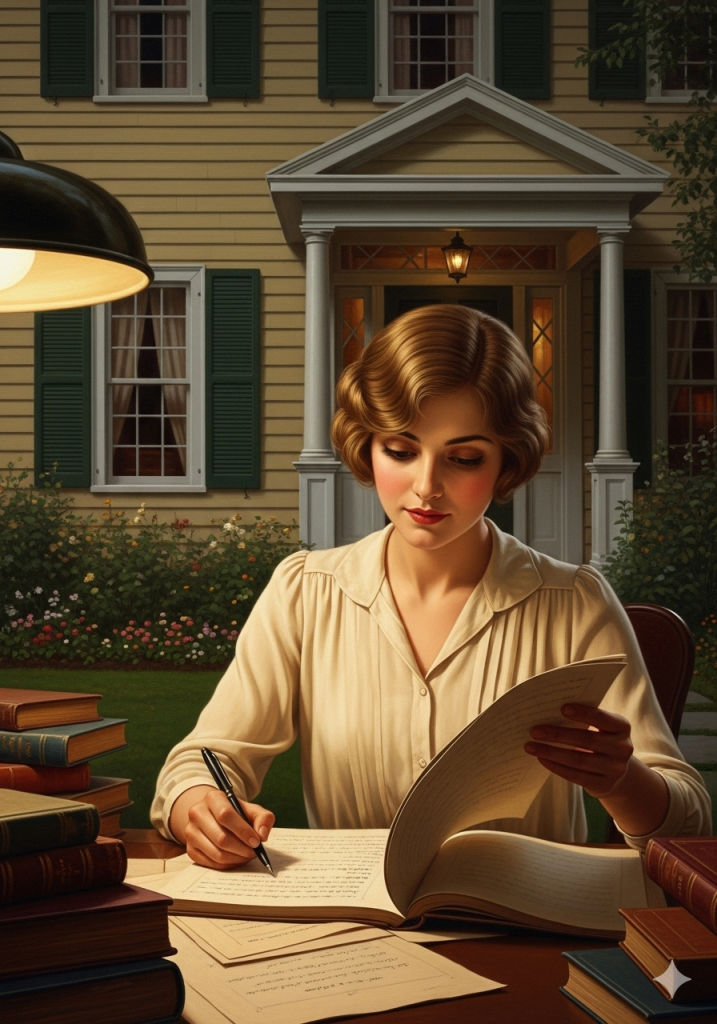
Scott and Katharine didn’t see eye to eye on everything. It was during her time at Vassar that Katharine and her friend Hester Smith would tell Scott about their fellow student, Edna St Vincent Millay, who would go on to have a complicated love-affair with Scott’s friend, Edmund Wilson. The girls had previously appeared together in the Vassar play, The Locked Chest. [17] At the time of their disagreement, Millay, who would go on to be one of America’s most celebrated poets, had just published the anti-war drama, Aria da Capo. [18] Scott had thought her a rather mean and conceited individual and the girls had been forced to defend her against the usual barrage of wisecracks and insults. Despite her outrageous points of view and her radical approach to sex, Scott considered Millay’s work too conventional and anti-Modernist.
The previous year, Katharine had worked on a college “movie” of The Trail of the Sandhill Stag with Vassar’s President, Henry Noble MacCracken, who was already well known for his liberal and pacifist views. [19] The story, written by fellow suffragist Ernest Thompson Seton, followed the struggles of a boy to survive in the wilderness. It was a man versus nature kind of thing and well ahead of its time on environmental issues. Life would take a more practical turn in November 1918, when Tighe volunteered to assist in reconstruction work at the Walter Reed Army Medical Center in Washington D.C. The experience must have been an interesting one as shortly before her return to Saint Paul in spring that year she had written an article for liberal news magazine, The Independent, listing ‘the merits’ of Army Nursing. [20] The newspaper’s editor, Hamilton Holt, was, like Katharine’s father, a fellow Brooklynite and a strong advocate of the League of Nations. In April that year he was warning that if the League of Nations failed, the whole of Europe would fall to communism. [21] A short time before this, Holt had been appointed by Colonel House to serve as liaison officer between the Americans and Europeans at the peace discussions in Paris. Katharine’s article, which runs to two full pages, shows a lively personality, every bit as witty and observant and irreverent as Scott himself, and an earthy disregard to the usual protocols of wartime propaganda. It also matches, barb for barb, the satirical force of the Sophomore Joke Book she edited at Vassar three years earlier. [22] Finding herself at a loose-end, Katharine had seized the opportunity to keep some kind of momentum going and spent the summer of 1919 picking through her friend’s handwritten manuscript. It was a sensible move from Scott: she had the same vision, the same morality and the same colourful sense of theatre to transform a coming-of-age story into a gospel for youth in rebellion.
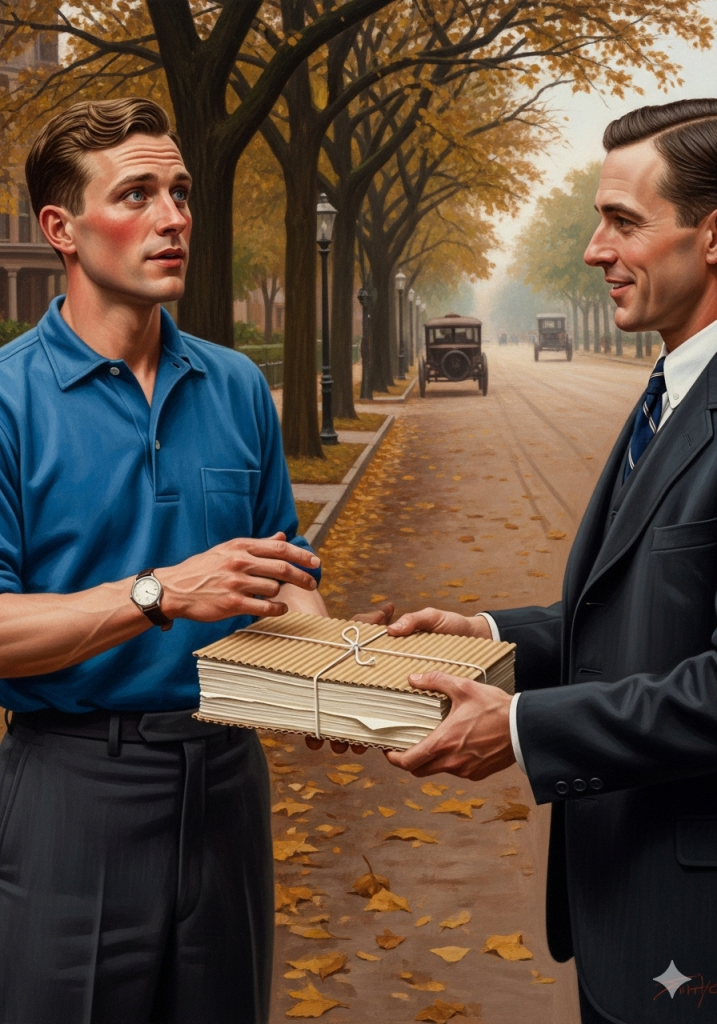
On August 16 that year, Scott scribbled off another letter to Scribner’s. He now had the wholething cracked. The submission they were about to receive was now a “well-considered, finished whole”. The novel had been completed. There were now only some minor corrections to make and the whole thing could be typed up. On the September 4th, he bound it snugly in corrugated cardboard and handed it to friend and neighbour, Tom Daniels, soon to be appointed 2nd Secretary to the US Embassy in Brussels, to drop it off at Scribner’s in New York. [23]
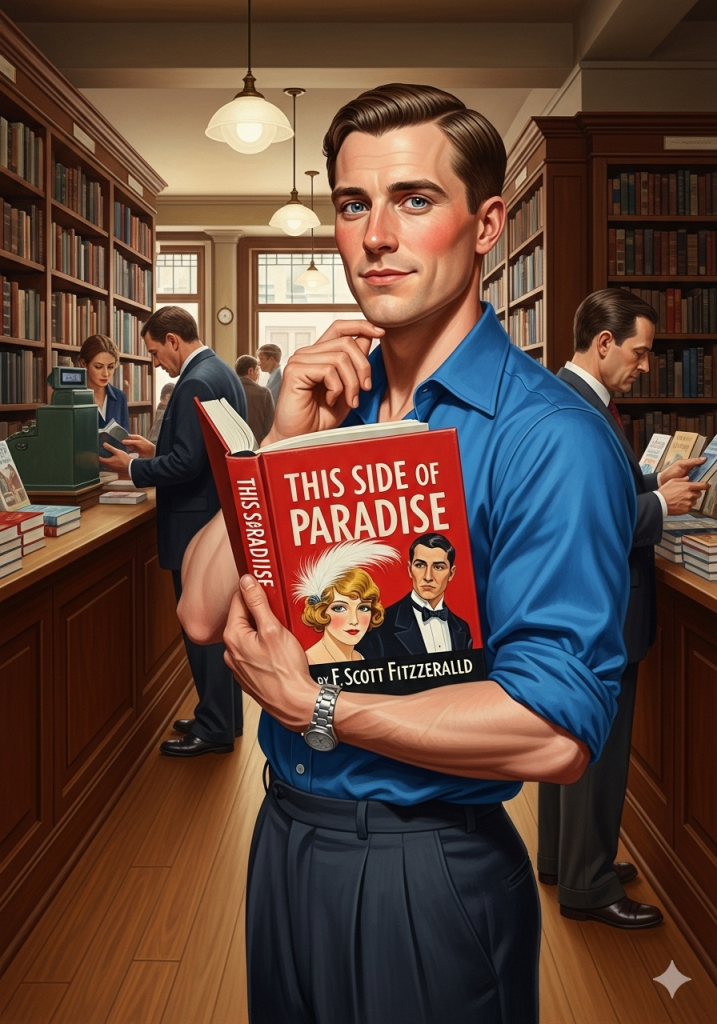
Between them, Scott and Tighe, who he would playfully refer to as ‘The Grammarian’ throughout the whole proofing process, had made a polished work of the scraps, and a few months later, Scott’s book was finally accepted by editor Maxwell Perkins. [24] Even then, it wouldn’t come without a fight. Scribner’s publishing executives still weren’t convinced by the novel. In the end, Max was left with little option but to tell his editor-in-chief that if he wasn’t prepared to publish work of this calibre then it was likely he would lose all interest in publishing books forever. The boy was talented, witty, charming, handsome to look at in photos — what was not to like? [25]
Alan Sargeant
[1] ‘Dear Mr Perkins, July 26, 1919, Dear Scott, Dear Max, 1973, p.17
[2] Zelda Fitzgerald to Henry Dan Piper, May 1947, Henry Dan Piper papers, Special Collections Research Center, Southern Illinois University Carbondale, Collection FP 17-8-1 Henry Dan Piper, Box 2, Folder 5
[3] ‘To F. Scott Fitzgerald, August 9, 1919’, ‘To F. Scott Fitzgerald, August 14, 1919’, Edmund Wilson: Letters on Literature and Politics, ed. Elena Wilson, Farrar, Strauss and |Giroux, 1977, p.44, p.45
[4] ‘To Edmund Wilson, 1919’, A Life In Letters, p.28
[5] Gotzian set-up the St Paul Brush Electric Light Company with James J. Hill and several other business in 1882. The families appear together in the society columns of the Saint Paul Press.
[6] ‘Medieval History of Tenth Street and its Mansards’, Saint Paul Globe, February 21, 1904, p.26
[7] The Letters of F. Scott Fitzgerald, ed. Andrew Tunrbull, Bantam Books, 1971, p.xiv. Turnbull writes that Scott wrote these words in the copy of Tender is the Night that he gave to Katherine.
[8] ‘To Be Wedded at Noon’, Saint Paul Globe, June 14, 1893, p.8. In 1887 Ambrose had published The Development of the Roman Constitution (Appleton and Company).
[9] ‘League of Nsations is Endorsed by Bar Meetings’, ‘Taft Shows Falsity of League Foes’, La Crosse Tribune, July 3, 1919, p.1, p.6
[10] ‘Winona Legal Men Home from Big Gathering’, Winona Daily News, July 5, 1919, p.
[11] ‘To Ernest Hemmingway, June 1926’, ‘To Maxwell Perkins, February 1929’, Correspondence of … , p.193, p.223. Ambrose Tighe was a lawyer and former journalist who served in the Minnesota House of Representatives (1903-1909) and even made a bid for congress. Scott would dedicate his 1923 play, The Vegetable to Katherine. She was born in Saint Paul in 1896
[12] ‘Katharine Tighe Fessenden: Midwife of Paradise’, Mary Jane LaVigne, The F. Scott Fitzgerald Review, Volume 19, 2021, p.15
[13] ‘Fessenden, Katharine Tighe, ed. The Boys Old Testament’, Vassar Quarterly, Volume XXIV, Number 2, 1 December 1938, p.20
[14] ‘This Side of Paradise’, Shane Leslie, The Dublin Review, Issue. 335, Vol. 167, October-December 1920, pp.286-87.
[15] “He went through a world that, in its frosty stillness, held beauty in its hands like a china cup.” The Prelude to Adventure, 1914, p.216
[16] ‘Katharine Tighe Fessenden: Midwife of Paradise’, Mary Jane LaVigne, The F. Scott Fitzgerald Review, Volume 19, 2021, p.15
[17] ‘The Locked Chest’, Vassar Miscellany Weekly, Volume II, Number 6, 17 November 1916, p.16
[18] ‘To D. Mildren Thompson, August 1938, Correspondence of … , p.511
[19] ‘Woodcraft Circle for Vassar’, Vassar Miscellany Weekly, Volume I, Number 21, 3 March 1916, p.5
[20] ‘Why I like Army Nursing’, The Independent, March 8, 1919, Vol 97 Iss 3665, p.332
[21] ‘Europe Will Go Bolshevik if League of Nations Fails’, The Portsmouth Star, April 13, p.28
[22] ‘Katharine Tighe Fessenden: Midwife of Paradise’, Mary Jane LaVigne, The F. Scott Fitzgerald Review, Volume 19, 2021, p.9. Levigne also reveals that the joke book was so biting that publication was suspended for several years.
[23] Thomas L. Daniels born 1893 lived at 786 Summit Avenue. He would also join the couple at Dellwood, White Bear Lake. In 1921 Daniels joined the diplomatic service and was assigned to the American delegation to the Disarmament Conference in Washington.
[24] ‘Dear Mr Perkins, September 4, 1919’, Dear Max, Dear Scott, p.20
[25] Max Perkins, Editor of Genius, A. Scott Berg, Dutton, 1978, p.16
Suggested reading:
Katharine Tighe Fessenden: Midwife to Paradise by Mary Jane LaVigne
